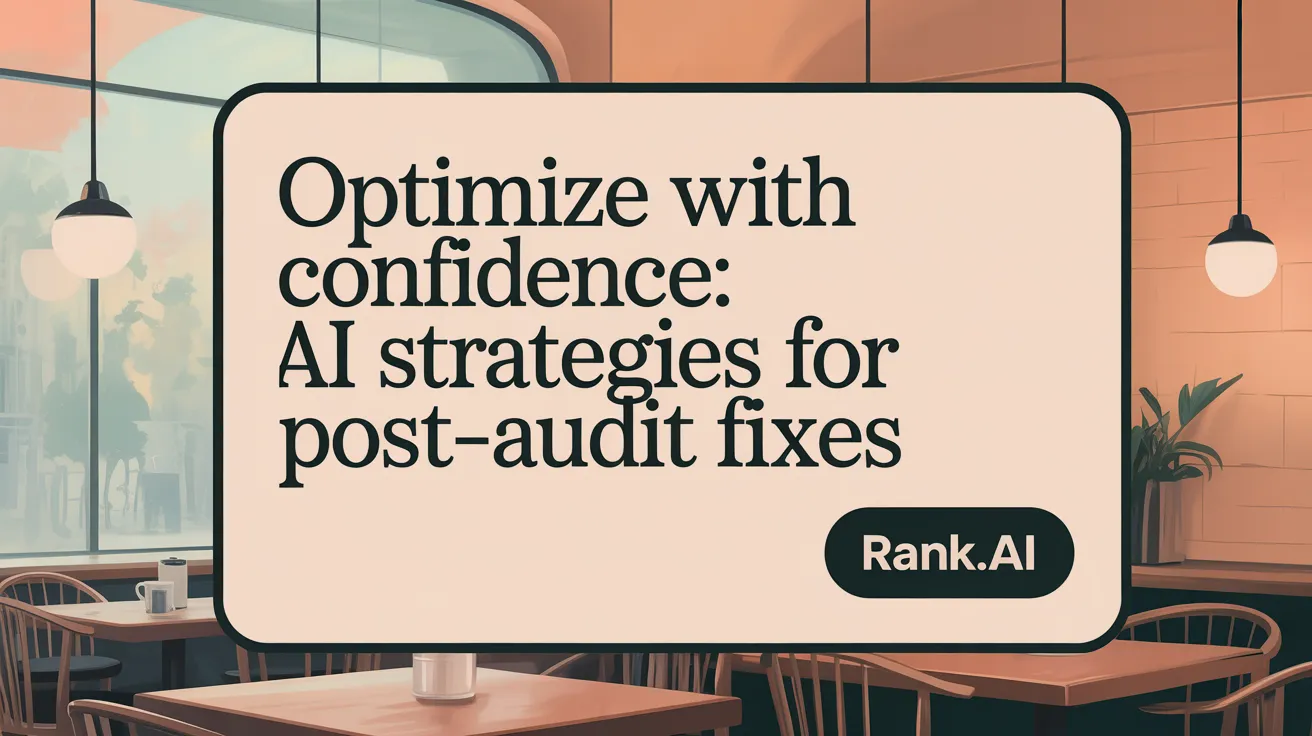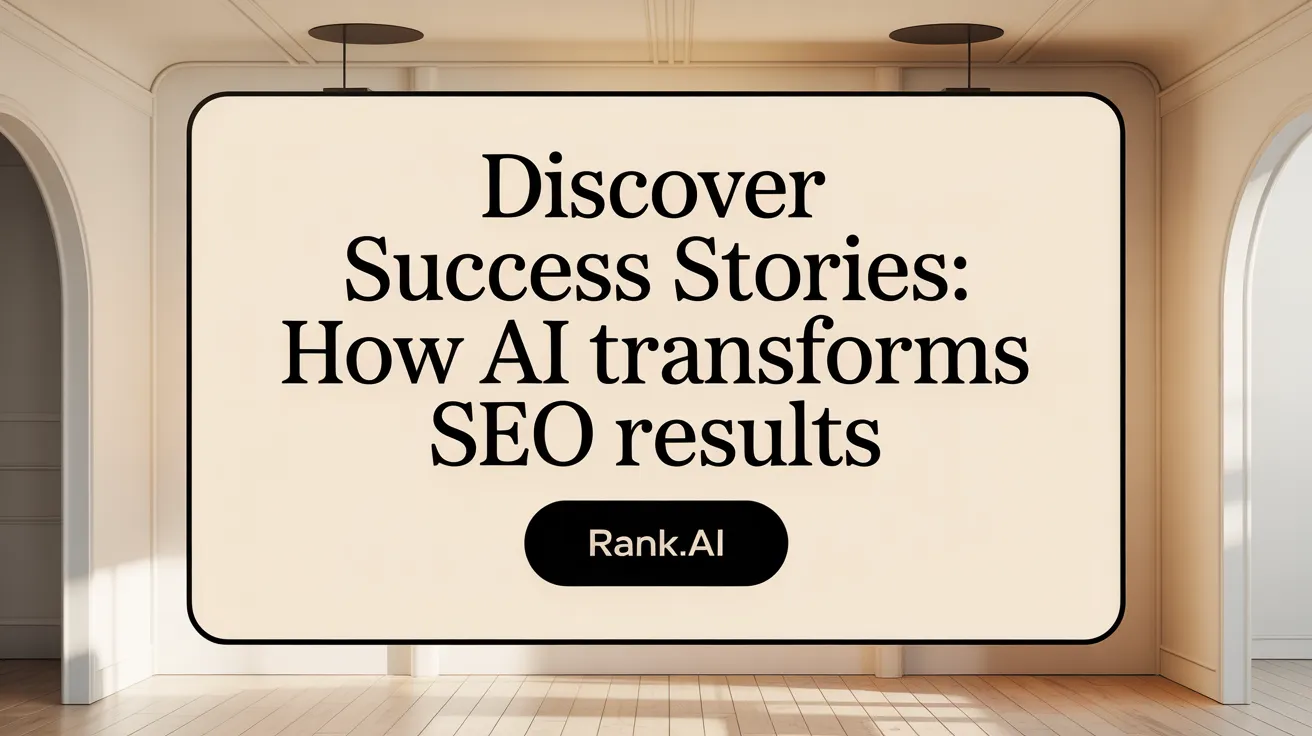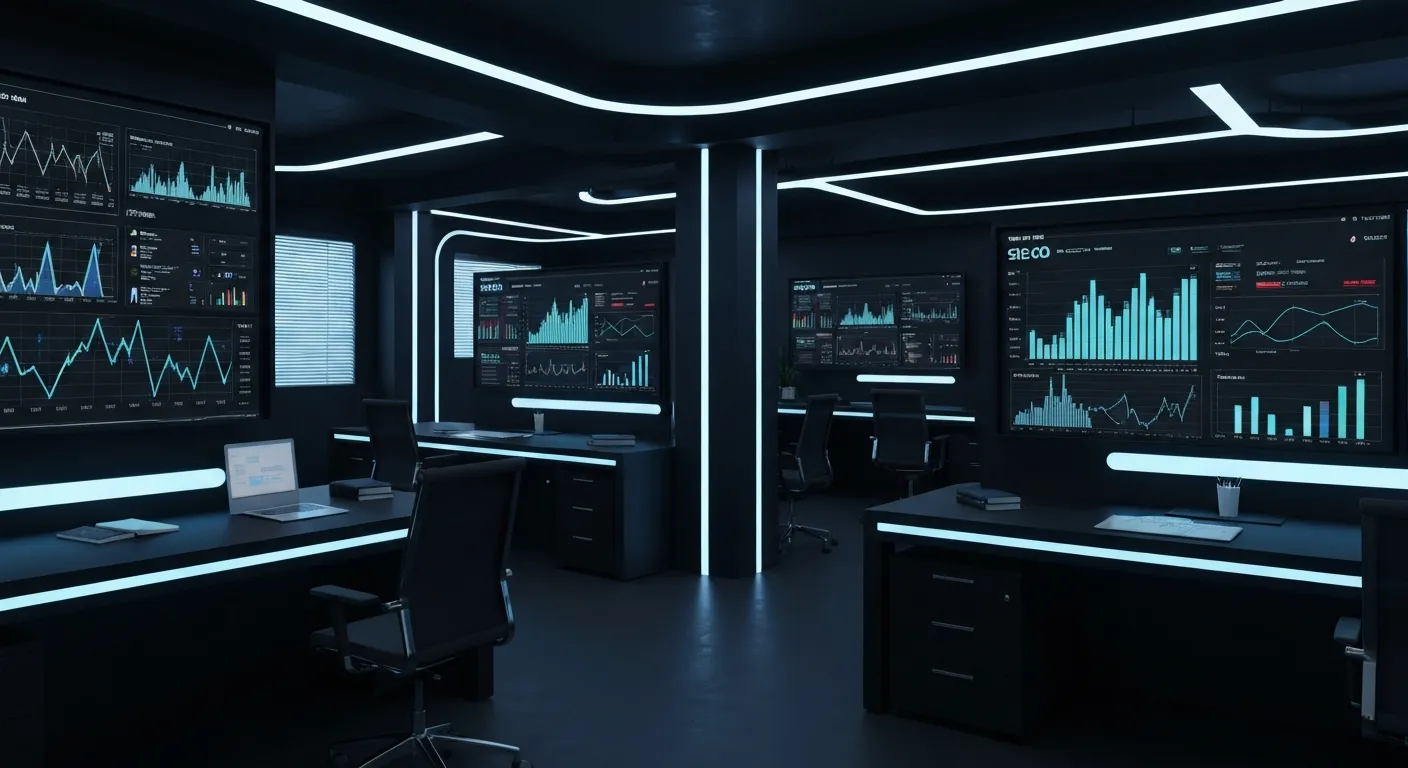How AI Enhances Technical SEO Audits and Fixes
Revolutionizing SEO: The Power of AI in Technical Audits and Optimization

The Rise of AI in Technical SEO
In the rapidly evolving world of search engine optimization, artificial intelligence (AI) is emerging as a transformative force, radically enhancing the efficiency, accuracy, and scope of technical SEO audits and fixes. As websites grow in complexity and search algorithms become increasingly sophisticated, traditional manual auditing methods struggle to keep pace. AI-powered tools and strategies not only accelerate the audit process but also provide deep predictive and prescriptive insights, enabling SEO professionals to maintain optimal website health and performance. This article explores how AI enriches every phase of technical SEO auditing and remediation, illustrating the benefits, methodologies, tools, and real-world successes that define this new frontier.
This SEO AI Agent Optimizes and Fixes your site's Mistakes ...
This AI agent is tailored for SEO. Here's what it does: 1. Analyses your site's technical SEO 2. Suggests changes and gives you the reason ...
AI’s Transformative Impact on Technical SEO Audits

How does AI enhance the processes and effectiveness of technical SEO audits?
AI dramatically improves how SEO audits are conducted by automating extensive data analysis and rapid problem detection. It can scan entire websites to identify critical issues such as broken links, duplicate content, redirect chains, orphan pages, and schema errors more efficiently than manual methods.
Beyond issue identification, AI monitors essential performance metrics including server response times, page loading speeds, mobile-friendliness, and accessibility. These insights help optimize user experience and ensure compliance with search engine standards.
AI tools also streamline the creation and validation of structured data, like JSON-LD schema markup, which enhances search engine understanding and increases the chances of rich snippets in search results. Generating and updating sitemaps and meta tags is simplified, ensuring sites stay properly indexed and visible.
Predictive analysis is another vital function of AI. By examining trends and historical data, AI can forecast future algorithm updates, guiding strategic adjustments before changes occur.
Overall, AI accelerates SEO audits, improves their accuracy, and provides continuous monitoring that detects new issues early. This allows SEO professionals to maintain robust website health, adapt promptly to algorithm shifts, and ultimately improve search rankings and user experience more efficiently.
Understanding AI’s Technical SEO Optimization Capabilities
What educational insights explain AI's capabilities in technical SEO optimization?
Educating oneself about AI in SEO reveals that its effectiveness is based on powerful machine learning and natural language processing (NLP) techniques. These technologies allow AI systems to analyze massive data sets, recognizing patterns, trends, and user behaviors that inform better SEO decisions.
Courses like 'Generative AI for SEO' showcase how AI tools automate repetitive tasks such as keyword research, content auditing, and technical site checks. This automation not only saves time but also increases accuracy by identifying issues that may elude manual audits.
AI's abilities extend to improving website crawlability and indexing. It can generate optimized metadata, fix technical errors, and suggest schema markup to make content more understandable for search engines.
Integrating AI into SEO workflows is crucial for staying competitive. Advanced AI tools predict future algorithm updates, adapt strategies accordingly, and personalize content to meet evolving search engine standards.
Educational programs emphasize that mastering AI’s role in technical SEO involves understanding how these tools analyze website structure, content relevance, and technical health. Overall, learning about AI's capabilities helps marketers automate complex processes, generate actionable insights, and enhance site performance efficiently.
In summary, AI in SEO is rooted in its ability to analyze data rapidly, automate tasks, and generate strategic insights, fundamentally transforming traditional SEO practices into smarter, data-driven approaches.
The Role and Benefits of AI in Detecting SEO Issues During Audits

What are the main roles and benefits of AI in identifying SEO issues during audits?
AI has become an essential tool for effective SEO audits by automating the detection of common technical problems such as crawl errors, broken links, and slow page load times. Its ability to process vast amounts of website data quickly means that SEO professionals can identify issues more efficiently than manual processes. AI leverages advanced technologies like natural language processing (NLP) and machine learning to analyze on-page elements, structured data, and content relevance. This comprehensive analysis helps uncover subtle issues that could impact search rankings.
One of AI’s key benefits is its capacity to provide more accurate and thorough assessments. It can identify patterns and anomalies that escape human detection, such as orphaned pages, redirect chains, or duplicate content. Also, AI tools continuously monitor site health, enabling proactive detection of potential future problems before they affect rankings.
Moreover, AI facilitates targeted recommendations, simplifying the process of fixing identified issues. It can suggest improvements for meta tags, schema markup, internal linking, and site structure adjustments, aligning content more closely with search engine expectations. Continuous monitoring and automated reporting through AI enable SEO teams to respond promptly to emerging issues, saving valuable time and resources.
Overall, AI enhances the depth, speed, and precision of SEO audits, empowering professionals to undertake smarter, more effective strategies. It ensures that websites maintain optimal technical health, adapt swiftly to algorithm updates, and continually improve user experience and visibility in search results.
Mechanisms: How AI Detects Problems and Suggests Solutions in SEO
How does AI detect SEO problems and suggest relevant solutions during audits?
AI employs sophisticated algorithms trained on vast datasets to identify common technical SEO issues efficiently. During a website audit, AI tools scan various site elements such as page speed, metadata, backlinks, and site structure to uncover problems like broken links, duplicate content, slow loading pages, and inadequate optimization.
Leveraging natural language processing (NLP) and machine learning, AI analyzes website content, technical configurations, and backlink profiles. This enables it to detect subtle issues that might escape manual review, such as orphan pages or redirect chains that can hinder search engine crawling.
Once problems are identified, AI generates detailed, actionable recommendations aligned with SEO best practices. For example, it might suggest compressing images to improve load times, fixing broken URLs, optimizing meta tags, or adding structured data markup to enhance rich snippets. These suggestions are based on industry standards and tailored to the specific site context.
AI also plays a continuous role beyond initial audits by monitoring ongoing performance. It analyzes trends in rankings, traffic, and site health, predicting future algorithm updates that could impact site visibility. Based on these insights, AI recommends strategic adjustments to keep SEO efforts ahead of search engine changes.
Overall, AI’s ability to automate comprehensive site evaluations and produce precise, targeted solutions saves time, reduces human error, and enhances the effectiveness of SEO strategies.
Leading AI-Powered Tools and Strategies for Streamlined SEO Audits
Which AI-powered tools and strategies are most effective for streamlining technical SEO audits?
Modern AI tools have revolutionized how SEO audits are conducted, making them faster, more thorough, and more accurate. Popular platforms like SEMrush, Ahrefs, Clearscope, and SE Ranking AI Tracker are at the forefront of this shift.
SEMrush and Ahrefs utilize machine learning algorithms to scan websites extensively, detecting issues such as broken links, duplicate content, page speed problems, and schema errors efficiently. These tools generate detailed reports with prioritized actionable insights, significantly reducing the manual effort traditionally required.
Clearscope and SE Ranking AI Tracker go a step further by offering content optimization insights alongside technical analysis. They evaluate content relevance, readability, and keyword usage, helping optimize on-page factors for better search performance.
Additional tools like Rankscale.ai, Indexly, and DataforSEO focus on real-time data extraction and indexing automation. They automate the collection of keyword data, backlinks, and search rankings, providing up-to-date insights that help marketers react quickly to SEO changes.
How does real-time data extraction and indexing automation improve SEO?
With real-time data capabilities, SEO teams can monitor website performance and search engine indexing status constantly. These systems automatically detect crawl errors, indexation issues, or new content that needs to be prioritized.
Automation of data extraction reduces delays between data collection and actions, enabling rapid responses—such as fixing crawl errors or updating site maps—to enhance indexation and ranking.
How can these AI tools be integrated with existing SEO workflows?
Effective SEO strategies incorporate AI tools seamlessly into existing processes. Many platforms offer integrations with popular CMS, analytics, and ranking tools like Google Analytics, Search Console, and Screaming Frog.
Automated reporting dashboards and APIs allow teams to embed AI insights into their daily workflows, making recommendations actionable in real time.
How are fixes prioritized using comprehensive metrics and scoring?
AI tools analyze numerous metrics — crawl efficiency, page speed scores, backlink quality, keyword competitiveness, and user engagement — to generate a scoring system.
This scoring helps teams prioritize fixes that will have the most significant impact on rankings and user experience. For example, fixing a high-impact crawl error or optimizing a page with low load speed takes precedence.
A Summary of Top Automation Strategies
Tool/StrategyMain FocusAdvantageIntegration LevelSEMrush, AhrefsTechnical Site AuditDetect issues quicklyHigh (APIs, plugins)Clearscope, Surfer SEOContent OptimizationEnhance relevance and readabilityMedium (content workflows)DataforSEO, IndexlyData & IndexingReal-time data updatesHigh (automated APIs)AI-driven scoringIssue PrioritizationFocus on high-impact fixesBroad application
By utilizing these AI tools and strategies, marketing teams can dramatically improve their site’s health, user experience, and ranking potential, all while reducing manual effort and errors.
Best Practices for Implementing AI-Driven SEO Fixes Post-Audit

What are best practices for implementing AI-driven SEO fixes after audit insights?
Once an SEO audit powered by AI tools uncovers technical issues and content gaps, the next step is to implement fixes that improve search engine rankings and user experience. Prioritize high-impact fixes by tackling issues that obstruct crawlability first, such as redirect chains, broken links, and orphan pages. Addressing these problems ensures better site indexation and faster load times.
Optimizing your website’s content and metadata for AI parsing is crucial. Focus on creating a clear and logical content structure, using relevant keywords naturally within headings, paragraphs, and metadata. Implement schema markup and other rich formats to enhance content visibility in rich snippets and featured snippets.
Enhance your site’s authority through the creation of high-quality, original content that resonates with your target audience. Regularly update content, build backlinks from reputable sources, and showcase social proof through reviews and awards. These efforts boost trust signals and enhance perceived expertise.
Continuous monitoring and iterative optimization are vital to maintaining SEO health. Use AI-powered tools to track rankings, user engagement, bounce rates, and conversions. Analyze these metrics to refine your strategies, ensuring your fixes remain effective as search algorithms evolve.
Humans play an essential role in overseeing AI suggestions. Experts should validate the automated fixes, ensure legal and ethical compliance, and inject strategic judgment. This blended approach leverages AI efficiency while maintaining content quality and brand integrity.
Incorporate multimedia elements like images, videos, and interactive content, optimized for both speed and accessibility. Use internal linking wisely to distribute PageRank and guide users through your site effectively. Structured data helps search engines better understand your content, improving your chances of appearing in multimodal search results.
Overall, combining AI-driven insights with human expertise, ongoing monitoring, and a focus on quality creates a sustainable SEO strategy that adapts to changing search engine algorithms, resulting in better visibility, higher engagement, and improved rankings.
Examples and Case Studies Showcasing AI-Driven SEO Improvements

Can you provide examples or case studies demonstrating improvements through AI-driven SEO?
AI-powered SEO solutions have proven their potential through real-world applications, delivering impressive results across different sectors.
One notable example is Flyhomes, a real estate platform. By utilizing AI tools to automatically generate and optimize a large number of pages, Flyhomes expanded from just 10,000 to over 425,000 pages within three months. This rapid expansion significantly boosted their website traffic to over 1.1 million monthly visits, demonstrating how AI streamlines content creation and site management.
Another success story is Brainly, an educational community platform. Through the strategic use of schema markup and keyword optimization powered by AI, Brainly tripled its keyword rankings. This approach helped the site gain greater visibility and attract more organic traffic.
ZOE, a fashion retailer, leveraged AI for image optimization by adding descriptive alt text and titles to thousands of images. This effort resulted in over 72,000 image snippets appearing in search engine results, enhancing their visual search visibility and attracting more users.
Explore and Xponent21 provide further evidence of AI’s benefits. Explore's focus on long-tail keyword pages led to a fourfold increase in traffic and improved search rankings. Xponent21’s comprehensive AI-driven SEO framework generated over 10 million impressions and secured top rankings within just a few weeks, showcasing how automation accelerates SEO success.
Furthermore, tools like BrightEdge and advanced GPT-based content automation platforms have been instrumental in enhancing organic traffic and search revenue for various clients. These platforms assist in automating content creation, optimization, and strategic planning, demonstrating the impact of AI in maintaining competitive search engine visibility.
Overall, these case studies highlight how AI transforms SEO practices by enabling rapid scaling, strategic keyword targeting, image enhancements, and content automation, leading to measurable improvements in traffic, rankings, and online visibility.
AI Automation: Accelerating and Enhancing Technical Site Audits
Rapid comprehensive site crawling and issue identification
AI-powered tools can quickly crawl entire websites to identify a wide range of SEO issues. Unlike manual audits, which are time-consuming and limited in scope, AI systems analyze large datasets swiftly, detecting issues such as broken links, duplicate content, redirect chains, schema errors, and page load problems. These tools use advanced crawling algorithms that adaptively prioritize high-value pages, ensuring critical areas are examined first.
Prioritization of high-value pages and optimization tasks
AI algorithms evaluate the significance of each page based on traffic, link authority, and content relevance. This way, they focus their efforts on the most impactful sections of the site. Once issues are detected, AI systems help prioritize fixes according to potential SEO impact, guiding teams to optimize high-priority pages more efficiently. This targeted approach enhances overall site performance and search visibility.
Detecting orphaned content and redirect chains
Orphaned pages—those with no internal links—can be difficult to find manually. AI tools automatically identify these pages and suggest internal linking strategies to improve site structure. They also analyze redirect chains to uncover loops or chain lengths that could slow down page load times and hinder crawl efficiency. Fixing these issues ensures smoother navigation for users and better crawling by search engines.
Increased audit speed and thoroughness compared to manual methods
AI dramatically accelerates audit processes by processing vast data more quickly and accurately than human auditors. It detects subtle issues that might be overlooked, such as minor technical errors or complex redirect patterns. This increased speed allows for continuous monitoring and swift implementation of fixes, ultimately maintaining optimal site health more effectively than manual efforts. AI-driven audits are scalable, ensuring large sites remain optimized without excessive resource expenditure.
Leveraging AI for Continuous SEO Monitoring and Alerts
How does AI enable real-time monitoring of SEO health and performance?
AI-powered tools continuously track various aspects of a website’s SEO, including page load speeds, crawl errors, and ranking fluctuations. These systems analyze large datasets rapidly, providing instant updates on website performance. This real-time oversight helps website owners promptly identify and address emerging issues before they impact visibility and user experience.
How do automated alerts improve website management?
Automatic notifications are a core feature of AI-driven SEO tools. When a problem such as broken links, crawl errors, or significant ranking drops is detected, alerts are sent immediately to the site administrators. This proactive communication allows rapid response and fixes, minimizing downtime and preserving search engine visibility.
What role does anomaly detection and impact prediction play?
Advanced AI algorithms analyze historical data and current performance metrics to spot unusual patterns—a process known as anomaly detection. They also predict potential effects of identified issues, such as how a sudden traffic decline might impact overall rankings. This foresight enables teams to prioritize fixes that will have the most significant positive impact.
How can insights from AI monitoring be integrated into development workflows?
Integrating AI insights into existing workflows ensures ongoing site health. Automated reports can be linked with project management and deployment tools so that SEO issues are addressed as part of routine updates. This seamless integration facilitates a proactive approach, reducing the risk of problems escalating and enabling continuous improvement.
Monitoring AspectAI CapabilitiesBenefitsPerformance MetricsReal-time tracking of site speed, responsiveness, and core web vitalsTimely issue detection and resolutionSEO Status UpdatesAutomated alerts for crawl errors, broken links, and ranking changesImmediate action to prevent ranking lossAnomaly DetectionPattern recognition to identify unusual data fluctuationsEarly problem identification, preventionWorkflow IntegrationSeamless alerts into project management and development toolsEfficient issue resolution and workflow continuity
By leveraging these AI-driven monitoring and alerting capabilities, websites can maintain optimal SEO health, adapt swiftly to changes, and sustain high user satisfaction.
Improving Site Performance with AI-Driven Optimization Techniques
Analyzing Core Web Vitals and Performance Bottlenecks
AI tools excel at evaluating critical website performance metrics, known as Core Web Vitals, which include loading speed, interactivity, and visual stability. By analyzing these metrics across different devices and user scenarios, AI identifies specific bottlenecks such as slow server responses, render-blocking resources, or inefficient scripts. This detailed insight allows developers to prioritize fixes that most impact user experience and SEO rankings.
Image Compression, Minification, and Caching
AI-driven platforms assist in optimizing website resources. They recommend or automatically implement image compression techniques that reduce file sizes while maintaining quality. Minifying CSS, JavaScript, and HTML files decreases load times by removing unnecessary characters and spaces. Additionally, AI tools suggest caching strategies—like leveraging browser caching and Content Delivery Networks (CDNs)—to serve content faster to users worldwide.
Server Response Improvement and CDN Leverage
AI analyzes server response times and identifies server-side issues affecting performance. It can recommend upgrades, configuration changes, or content distribution strategies. Using AI, websites can dynamically adapt their use of CDNs to cache popular content strategically, reducing latency and improving load speed, especially for international visitors. This proactive approach ensures that server bottlenecks are minimized, and content delivery remains swift.
Enhancing Mobile Usability and Accessibility for Indexing
With mobile-first indexing becoming the standard, AI systems evaluate mobile usability and accessibility features. They check for responsive design, touch-friendly elements, and accessible content structure. AI provides actionable suggestions—like optimizing viewport settings, improving font sizes, or enhancing contrast ratios—that ensure websites meet search engine requirements and provide a seamless mobile user experience.
AspectAI-Driven Optimization TechniquesBenefitsCore Web VitalsPerformance analysis and bottleneck identificationBetter rankings, improved user experienceImage & CodeCompression, minification, cachingFaster load times, reduced bandwidthServer & CDNResponse time analysis, CDN deploymentReduced latency, global performanceMobile & AccessibilityUsability and accessibility auditsBetter mobile indexing, wider reach
By leveraging AI for these optimization areas, websites can significantly improve their speed, responsiveness, and user engagement, all while aligning with SEO best practices.
AI-Enhanced Structured Data Implementation for Better Search Visibility

How does AI help identify schema markup opportunities?
AI tools analyze website content to spot content types suitable for structured data markup, such as products, reviews, or events. These tools recognize patterns and entities within the content, suggesting where schema can add context. By automating this detection, AI ensures that no valuable schema opportunities are overlooked, making pages more attractive to search engines.
How does AI automate JSON-LD generation and validation?
AI systems can generate JSON-LD schema markup automatically based on content analysis, reducing manual coding errors. They produce structured data snippets that embed seamlessly into web pages. Additionally, these tools validate the generated schema, ensuring compliance with standards like Schema.org and preventing errors that could hinder search engine understanding.
How does AI monitor schema health and relationships between entities?
AI continuously checks the accuracy and consistency of schema markup across a website. It detects issues such as missing relationships, broken or incomplete schemas, and potential conflicts. AI also maps interactions between entities—like products linked to reviews or local businesses associated with addresses—thus maintaining a coherent and comprehensive data network.
How does enhanced schema implementation drive rich snippets and improved SERP features?
Effective AI-driven structured data enhances search results by enabling rich snippets, such as star ratings, product prices, or event details. This visual enhancement increases visibility, click-through rates, and overall search performance. By automating schema deployment and monitoring, AI ensures that websites maximize their chances of qualifying for these search enhancements, resulting in a competitive edge in SERPs.
Optimizing Internal Linking and URL Structures with AI Assistance
How does AI analyze semantic content and recognize entities?
AI leverages natural language processing (NLP) to understand the meaning behind website content. It identifies key entities such as people, places, products, and topics, which helps it map the relevance between different pages.
This deep understanding allows AI to suggest strategic internal links by connecting related content segments. It can pinpoint opportunities where linking related pages can enhance user experience and search engine understanding.
What recommendations does AI provide for internal linking and anchor text?
AI tools analyze the content and identify relevant keywords and phrases for effective anchor text. They recommend anchor texts that are descriptive, keyword-rich, and aligned with search intent, thereby improving SEO and user navigation.
Furthermore, AI can automate internal linking strategies, creating or suggesting appropriate links that help distribute page authority and guide visitors smoothly through a website.
How can AI help ensure URLs are clean, descriptive, and use proper canonical tags?
AI assists in auditing URL structures, checking for unnecessary parameters, inconsistent formats, and duplicate content issues.
It recommends rewriting URLs to be clear and descriptive, reflecting the content of each page. Additionally, AI tools analyze canonical tags to make sure they are correctly implemented, preventing duplicate content and ensuring search engines index the preferred versions.
How does AI support preventing duplicate content and improving site navigation?
AI scans the entire website to detect duplicate pages, including near-duplicates, that could harm search rankings.
It suggests canonicalization and content restructuring to consolidate similar pages. This improves overall site navigation, making it easier for users and search engines to find the most relevant content.
By automating these processes, AI helps maintain a well-organized website structure that boosts both user experience and search engine visibility.
AspectAI CapabilitiesBenefitsAdditional NotesSemantic content analysisRecognizes key entities and themesBetter internal linking strategiesUses NLP for content understandingAnchor text recommendationSuggests descriptive, keyword-rich anchorsEnhances SEO and navigationAutomates link creationURL structure auditingChecks for clarity, parameters, and duplicatesEnsures clean URLsAids in proper canonicalizationDuplicate content preventionDetects and suggests fixes for duplicatesImproves rankingConsolidates similar content
Incorporating AI into internal linking and URL management streamlines website optimization efforts, supports better SEO performance, and improves user experience with minimal manual effort.
Combining Human Expertise with AI for Optimal SEO Outcomes
Why is human oversight essential when using AI for SEO?
While AI offers powerful automation and insights, human judgment remains crucial for validating recommendations. AI can identify issues like broken links or technical errors efficiently, but strategic decisions—such as prioritizing certain fixes or interpreting complex content nuances—require experienced SEO professionals. Human experts can assess the context behind AI suggestions, ensuring changes align with broader marketing goals.
How can AI be integrated into existing SEO workflows?
AI tools seamlessly fit into current SEO practices by supplementing manual audits, content creation, and technical fixes. For example, AI can generate sitemaps, craft meta descriptions, and monitor website health automatically. Integrating these tools through dashboards or APIs allows teams to streamline tasks, freeing time for more strategic activities like content planning and user experience optimization.
What are the limitations of AI and how to address them?
Despite advancements, AI can sometimes misinterpret context or overlook subtleties in content and website architecture. It may also face challenges with evolving algorithms or unusual site structures. To mitigate these issues, regular human reviews of AI outputs are necessary. Continuous updates and training of AI models help improve accuracy and relevance.
Why is strategic judgment and ongoing learning important?
SEO is an ever-changing field influenced by search engine updates, user behavior, and industry trends. Human expertise ensures that AI's automation supports a forward-looking strategy rather than just reacting to current issues. Ongoing education, staying updated with algorithm changes, and assessing AI's performance enable teams to adapt and refine their SEO efforts continually.
Final thoughts
While AI significantly enhances technical SEO by automating many complex tasks, combining it with strategic human oversight maximizes effectiveness. This synergy drives better decision-making, maintains alignment with business goals, and ensures that websites remain competitive in search rankings.
The Future of Technical SEO is AI-Driven
Artificial intelligence has ushered in a new era for technical SEO audits and optimization, delivering unparalleled speed, precision, and strategic foresight. By automating complex data analyses, detecting subtle issues, and providing actionable remedies, AI empowers SEO professionals to optimize websites more effectively than ever before. The synergistic combination of AI tools and human expertise ensures solutions are both innovative and contextually sound. As AI technologies evolve, their integration into SEO workflows will become indispensable, enabling continued adaptation to search engine advancements and user expectations. Embracing AI-driven technical SEO practices is no longer optional but a vital strategy for maintaining competitive advantage and driving long-term digital success.
References
- How to Improve Technical SEO Using AI (Proven Tactics)
- Navigating the Future of SEO: The Role of AI for Technical ...
- How can I use AI tools to identify and fix SEO issues?
- Mastering SEO Audits: How to Leverage AI to Boost Your ...
- Automating Technical SEO with AI: Site Audits, Internal ...
- AI Agents for Technical SEO: 7 Ways to Use ...
- Using AI Automation to Streamline Technical SEO Audits for ...
Table of contents
Recent articles
Fresh insights on AI and SEO to help you stay ahead of the curve.


Ready to Improve
Your Rankings?
Use our free tools to get instant insights into your SEO performance and discover opportunities to rank higher




